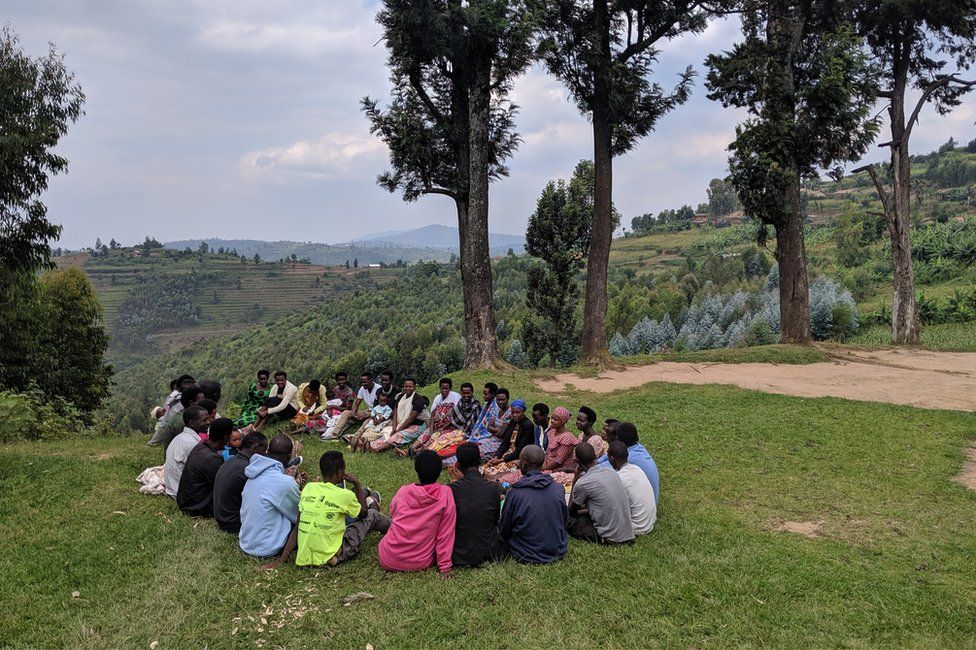
Continuing our series of articles from our Annual Report 2021/22, we outline here our work on our Young Survivors Counselling Project.
Thousands of youthful survivors of the 1994 genocide are only now confronting the horror of seeing their families murdered. They struggle to make ends meet, alone and vulnerable, prone to depression and hopelessness.
Through support from our partner Network for Africa we are working with AERG to train counsellors who in turn train local people to become counsellors. The counsellors are themselves survivors who have endured trauma, so they are familiar with the challenges faced by people with depression and other mental health issues. The counsellors are coordinated by SURF Senior Key Worker, Emilienne Kambibi
Through support from our partner Network for Africa we are working with AERG to train counsellors who in turn train local people to become counsellors. The counsellors are themselves survivors who have endured trauma, so they are familiar with the challenges faced by people with depression and other mental health issues. The counsellors are coordinated by SURF Senior Key Worker, Emilienne Kambibi.
In spite of getting off to a late start in March instead of January 2021 because of Covid, the youth peer counselling project has had a positive impact on the lives of the 268 participants (154 women and 114 men). They were formed into 12 peer support groups, and 12 women and 12 men were selected to be peer support counsellors (PSCs) – two per group. They were trained in trauma and group counselling skills and how to moderate the group counselling sessions. They were supervised by SURF’s counsellors and received their own supervision sessions every three months, where they were able to strengthen their counselling skills and discuss difficult cases in a supportive environment.
The participants adapted to Covid-19 restrictions during the year, carrying out telephone counselling when it wasn’t possible to meet physically. In total 181 group counselling sessions were held across all 24 groups. SURF’s counsellors were on hand to provide individual counselling to those who needed it and 118 participants benefited from individual counselling during 2021. Home visits were also an integral and important part of the programme, and 198 vulnerable participants were visited at home during the year.
The commemoration of the genocide in April was particularly hard as it took place during ongoing lockdown restrictions but they were supported well by the coping mechanisms they had been taught and whilst 22 of the participants presented with trauma, they have recovered well.
The project’s counsellors worked with the District administrators to carry out awareness-raising in the community on mental illness, and how to avoid depression and suicide. They engaged in a programme of psycho-education for the participants, where they talked about the benefits of Covid vaccinations, taught relaxation exercises to cope with loneliness and isolation etc
Fifty of the participants were selected at the start of 2021 to take part in the baseline survey, and the same cohort took part in the survey at the end of the year. Some of the highlights were:
- The number of participants who felt their thoughts were preventing them from doing something others do reduced from 92% to 12% over the year.
- At baseline, 64% had given consideration to taking their own lives in the previous week – this figure reduced to 6% at the end of the year. Whilst we would prefer there to have been no suicide ideation, the counsellors know who these 3 people are and are providing ongoing support.
- Even though participants are still facing issues of trauma and its symptoms, at least 94% of them agree that they know how to deal with these symptoms.
At the start of 2022, 273 new participants (116 women, 112 men) were selected and have formed into 12 groups.
Jean *
Jean is a 28-year-old survivor of the genocide, and a participant in the youth counselling groups.
“My mother was killed during the genocide and I was left with my father, who soon remarried. I suffered from nightmares, intense anxiety, and the grief of losing my mother. Being part of the counselling group has helped me make friends and regain a sense of meaning in my life. My Peer Support Counsellor has visited me at home, helping me resolve the conflicts with my stepmother. With the counsellors’ support, I understand that anger and sorrow only hold me back. I’m now in a better mental state, capable of making the most of life. I’ve learned relaxation techniques that I use to improve my sleep and overcome nightmares. Before, I was lonely and had no friends. But now, in this counselling group, I feel loved and cared for my other people. I’ve learned that anger only damages my future and prevents me moving forward. And I’ve forgiven my stepmother. Now, I’m planning to get married and start a family of my own.”
